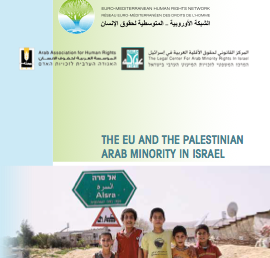UN Human Rights Committee to Review Israel on 20 October 2014; Adalah and partners submit reports
This month, Adalah submitted NGO reports to the UN Human Rights Committee (HRC) on the human rights of Palestinian citizens of Israel in general, and together with the Negev Co-Existence Forum (NCF), on the human rights of Arab Bedouin citizens living in the Naqab/Negev.
In Geneva on Monday 20 October 2014, the Committee will review Israel’s compliance with the International Covenant on Civil and Political Rights (ICCPR), which Israel ratified in 1991. Representatives of Adalah, together with other partner human rights organizations, will attend the session. The Committee last reviewed Israel four years ago in 2010, and issued 20 principal subjects of concern and concluding observations for Israel to improve its human rights record.
Adalah’s reports, which respond to the Committee’s questions and Israel’s replies, show that Israel is violating numerous articles of the ICCPR through its discriminatory laws and policies that target the rights of its Palestinian minority citizens.
Adalah’s report on Palestinian citizens highlighted that:
-
Due to the absence of a right to equality in Israeli law, the Knesset repeatedly enacts legislation that discriminates against Palestinian citizens, and the Israeli Supreme Court upholds many of these laws (e.g., the Nakba Law, the Admissions’ Committee Law)
-
The government continues to carry out discriminatory policies in land, planning and housing that allocate more state resources and benefits to Israeli Jewish citizens, and to illegal Jewish settlements in the Occupied Territories, while greatly marginalizing Palestinian citizens in Israel;
-
Palestinian Arab citizens, particularly Arab women, remain greatly underrepresented in the Israeli civil service due to the state’s failure to implement the law. Arab citizens face further gross discrimination in employment due to unrelated military service requirements and racism;
-
Arab political parties and parliamentarians continue to be harassed by the Israeli authorities through election disqualification motions, Knesset sanctions, and the issuance of selective criminal indictments against them;
-
Israeli police violated numerous laws and procedures during the arrests and interrogation of Palestinian citizens, including minors, following demonstrations against the Prawer Plan in 2013 and the War on Gaza in the summer of 2014.
Adalah's and NCF's joint report on Arab Bedouin citizens highlighted that:
-
The Israeli authorities systematically demolish homes belonging to Arab Bedouin citizens of Israel living in both unrecognized villages and newly-recognized villages; in 2013, 697 Bedouin homes were demolished in the Naqab;
-
Arab Bedouin are unable to obtain building permits in unrecognized villages due to discriminatory laws and policies, as well as in newly-recognized villages due to the lack of master plans;
-
The Prawer Plan is presented by the Israeli government as a progressive socio-economic development plan, whereas, in fact, the plan would demolish some 35 unrecognized villages and displace and dispossess up to 70,000 Arab Bedouin from their lands and homes. Although the legislation for the plan has been frozen, Israel is continuing to implement it on the ground. The Prawer ‘displacement’ Plan is currently the most urgent threat to Arab Bedouin citizens’ human rights;
-
Israel deliberately withholds the provision of basic services to Bedouin citizens from unrecognized villages, including water, electricity, and others in order to pressure them to abandon their lands and rightful land claims.
For more information:
Adalah press release, “UN HRC Releases List of Issues for Israel, asks key questions about Palestinian citizens of Israel”, 18 September 2012
Adalah’s report to the UN HRC, “Suggested Issues for Adoption of List of Issues Prior to Reporting”, 11 June 2012
Read more:
-
Land and planning, Unrecognized Arab Bedouin villages, Discrimination against Palestinian citizens of Israel, United Nations, Arab-Bedouin citizens of Israel, International Advocacy, Arab Palestinian Members of Knesset, Prawer Plan, Arab Palestinian Collective Rights in Israel, Recognized Arab Bedouin villages, UN Office of the High Commissioner on Human Rights (OHCHR)
















